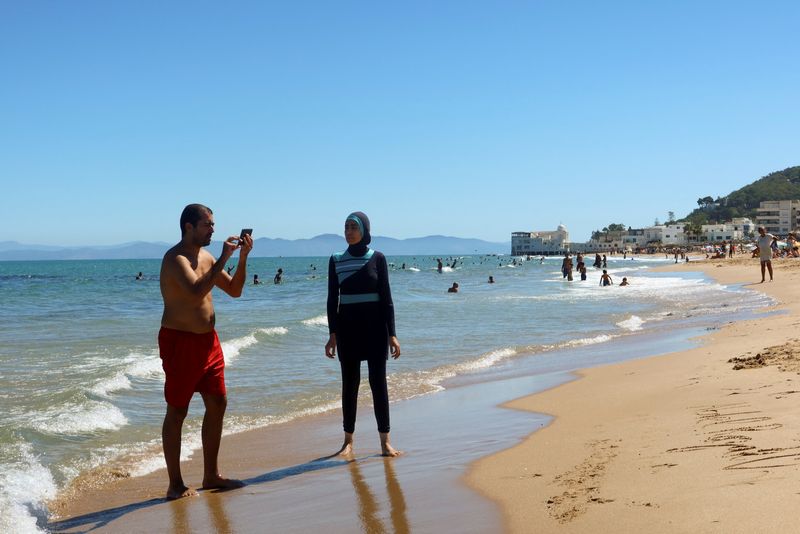By Layli Foroudi
(Reuters) - On the second day of her stay at the Marriott Hotel in Sousse, Jannette Mensi waded into the swimming pool only to be told by hotel staff that she would have to get out due to her choice of swimwear -- a burkini.
"I was shocked, my mind froze - I never thought this would happen to me in my own country," said Mensi, 68.
The burkini, which leaves only the face, hands and feet exposed, is worn by some Muslim women who wish to preserve their modesty and is commonly seen worn on beaches in Tunisia, a majority Muslim country.
But numerous high end hotels in coastal tourist towns have banned the swimwear from their pools - a policy that reflects enduring European, particularly French, influence in the country, as well as divisions between secular and conservative Tunisians.
On the website Tunisiabooking.com, at least 20 hotels advertise that the burkini is banned at their establishment.
For Mensi, who was informed she could only swim in the Marriot's back pool, generally used by children, the ban discriminates against her as a Muslim woman.
"I respect, I accept next to me a lady with a bikini, or someone drinking wine... I respect them, they should respect me," she said.
Following questions sent by Reuters, a spokesperson for the Sousse Pearl Marriott Resort & Spa apologised and said they would extend access to the main pool "to all adult guests, no matter the swimwear they choose."
CUSTOMER COMPLAINTS, BAD REVIEWS
Hotel burkini bans in Tunisia date back to the 2000s and became more common after the 2011 revolution, when more women started wearing the hijab. The Muslim headscarf previously attracted police harassment under toppled dictator Zine el Abidine Ben Ali and was banned in the workplace during his 23-year rule.
While the Marriott hotel worker did not explain the reasons behind the ban, Mensi has her own theory.
"I told them: you are colonised from then until now," she said.
The managing director of a 4-star hotel in the popular beach resort of Hammamet, who wished to remain anonymous, told Reuters that he banned the swimwear in 2008 following complaints from guests, initially from French visitors but often from local tourists, too.
In France, where the hijab is banned for public servants and in schools as part of the state's policy on secularism, the burkini has stirred national debate at regular intervals.
But reactions to the burkini in Tunisia reveal faultlines of religion and class within society, where some well-off Tunisians hold secular values and are intolerant of signs of religious conservatism.
"The last people I spoke to said that it is disgusting to swim in a pool with burkinis," the hotel managing director said.
His decision to ban the burkini was part of a strategy to attract a richer clientele, as "the burkini-wearing population, the majority are in the low-budget category," he added.
However, the burkini ban has started to attract bad reviews, too.
In a widely shared TikTok video earlier this year, Emirati influencer Zainab Alsawalhi denounced the burkini-free Movenpick Hotel in Sousse for "discrimination and hate".
The Accor (EPA:ACCP) group, which owns Movenpick, did not respond to questions sent by Reuters seeking reaction to those remarks.
